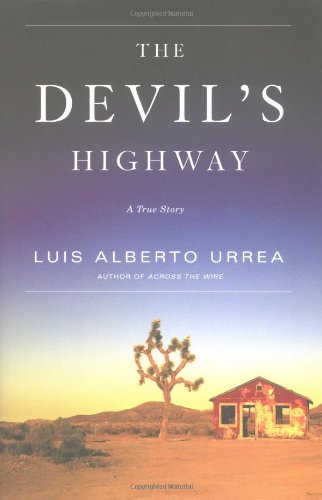
This is a true story written into a book by Luis Alberto Urrea.
Born in Tijuana, he has written several books about the U.S. / Mexican border.
But this one stirred up controversy since he needed the U.S. Border Patrol to open up about how they do their work to flush out the hundreds of details about this tragic event.
At one point his life was threatened to not write it.
Admittedly, he was sour on the agency, since being from a border town, many of his family have been roughed up by the patrols.
But as his research continued, he gained profound insight on the agency.
They have a nearly impossible job. And rarely does anyone think they’re doing it right.
About the desert: There’s a region of southern Arizona where migrants from Mexico cross into the U.S.
There is no wall there, just a rocky dry wash that floods during monsoonal squalls.
This area is so harsh, so grueling the agents are often afraid to patrol it. They call it The Devil’s Highway.
Technically it’s the dirt track that runs parallel to the border, but generally refers to the invisible path that’s taken by the migrants once they cross.
I’ve always been fascinated with the idea of such a daring feat – trying to cross a cooking hot desert, especially by people least prepared to survive it and often wonder: Could I survive trapsing across the Arizona desert for days on end?
As an experienced outdoor person, I'd like to think I could. But I wouldn't think of trying without some serious training.
You'd have to get used to carrying many liters of water, have proper clothing too - like good boots, dark sunglasses and wide brim hat. What else?
An established route. Maybe a trail to follow, but otherwise line-of-sight or other basic navigation skills along with a paper or digital map.
Don't forget a basic first-aid kit to deal with snake bites and cactus prickers.
As for these migrants in this landscape, think about taking away all these things that would make such a trip feasible.
Suddenly it's not a fair fight: No training, proper clothes, or enough water.
Many have come from humid and tropical southern Mexico, Panama or El Salvador.
They have never felt the arid wind and sun perform its amazing feat of sucking the moisture out of everything.
The desert is an unfamiliar new kind of hell and they're lead into the deep end to figure it out as they go.
Add to all this chaos, is the fact that the desert is just another segment of a very long journey far from home.
Before the crossing, they’ve been stuffed in vehicles, rural bus rides, overnight stays at sketchy “motels”, been lied to, ripped off, and treated like shit by the coyote that has taken most of their money and sold them so many fanciful stories of how getting across the desert is routine.
It's never routine, although a significant number do survive only to begin another part of their journey at a Border Patrol station jail cell.
The event in question happened in 2001. 26 Mexican migrants crossed into The Devil’s Highway. About half of them died.
Their goal was to get to a rendezvous point for another contact to meet them with a ride to the next leg of their journey.
But the coyote got lost. Frustrated, he took all their cash and left them to fend for themselves against the heat and the wind.
Once word got out that there could be several bodies, every Border Patrol vehicle from every field office in the southwest was dispatch at the same time in an attempt so find the men.
The terrain will chew through your shoes and 4x4 tires. 70 flat tires were counted across all the patrol Ford Explorers that week.
Urrea exposes the end-to-end process that the smugglers have in place that leads to the crossing. It's eye-opening to see how intricate the process is and how it all works.
Politics aside, you discover the complicated and desperate situation for Mexicans - and others south of our border - which is the foundation of the urge to take such a risk. They are sold many promises and often it's too late to wiggle out of a bad situation that's getting worse.
Urrea also writes about how the Border Patrol is caught in the middle of a culture war between those Americans who want the migrants treated like prisoners, and those that want to help them assimilate into a better life.
All while the agency is understaffed and underfunded and usually misunderstood.
And, although this event happened some two decades ago, the story rings relevant as ever.
The forces that grind away at the situation are still churning and - most agree - is worsening. The solutions remain just as elusive. The insight Urrea offers is just as valuable.
I like this book. Urrea is a fine writer and digs deep a subject we all hear about in the news, but rarely know the details.
And, at only 272 pages it goes fast. Highly recommended.
See a used version at ThriftBooks.com.
-- -- -- --
If you can recommend other books by Luis Alberto Urrea, let me know in the comments!
Comment password is: life is good